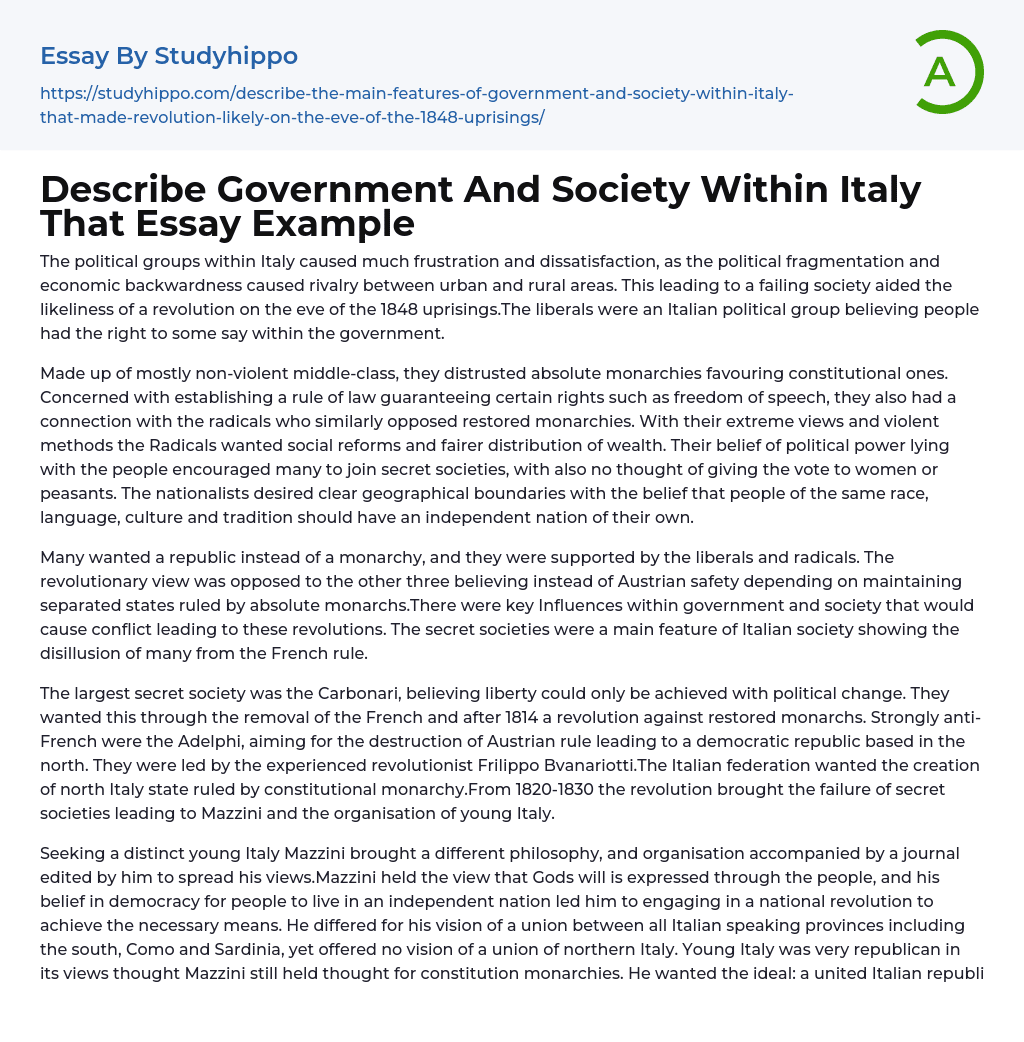

Describe Government And Society Within Italy That Essay Example
Italy experienced discontent and frustration due to political factions causing rivalry between urban and rural areas, fueled by political fragmentation and economic underdevelopment. This led to a deteriorating society, increasing the potential for a revolution similar to the events of 1848. The Italian liberals advocated for citizen participation in government.
Consisting mainly of nonviolent middle-class individuals, the group held a distrust towards absolute monarchies and favored constitutional ones. Their goal was to establish a system that ensured certain rights - like freedom of speech and assembly- in order to enforce the rule of law. While they shared some principles with radicals who sought social reforms and an equal distribution of wealth through extreme measures, they did not consider extending voting rights to women or peasants despite advocating for political power to rest with the people. Nationalists aim
...ed for independent nations based on shared race, language, culture, and tradition while opposing restored monarchies.
Supported by liberals and radicals, many advocated for a republic over a monarchy. However, those with revolutionary views opposed the idea of maintaining separated states ruled by absolute monarchs, believing instead that Austrian safety depended on this. Conflict within government and society was influenced by key factors, including secret societies which exemplified the disillusion with French rule in Italian society.
The Carbonari were the largest secret society and believed that political change was necessary in order to achieve liberty. They aimed to achieve this through the removal of the French and a revolution against the restored monarchs after 1814. The Adelphi, on the other hand, were strongly anti-French and sought to destroy Austrian rule, with the goal of establishing a democratic republic
in the north. Their leader was the experienced revolutionist Frilippo Bvanariotti. Another group, the Italian federation, sought the creation of a north Italy state ruled by a constitutional monarchy. However, from 1820-1830, the revolution failed to succeed through secret societies, which later led to Mazzini and the organization of young Italy.
Mazzini introduced a fresh perspective to the quest for a unique young Italy, accompanied by an alternate philosophy and organization. He also published a journal to promote his ideals. Mazzini believed that the people's will represented God's will, and democracy was necessary for individuals to live in an autonomous nation. To achieve his aspirations, he participated in a national revolution. Mazzini's vision was to unite all Italian speaking provinces, including the south, Como, and Sardinia, though he did not propose a union for northern Italy. Young Italy held republican views, but Mazzini also believed in constitutional monarchies. His ultimate goal was to establish a unified Italian republic and even urged King Piedmont to lead the movement for a united Italy.
During this time, Italy saw an increase in the movement to establish itself as a united nation. The spreading of this ideology resulted in the recruitment of new supporters for the revolution, although a failed coup attempt led to a harsh government response and the execution of some members. A similar situation occurred the following year with planned attacks never coming to fruition. In 1843, Vimenzo Gioberti wrote "Primato morale" and "Delgi Italiani," agreeing with Mazzini that Italy should rid itself of foreign influence. Gioberti believed that the Italian states should come together in a federation with Pope leadership, which would give Italian morale an
advantage over Europe. As an alternative to Mazzini's proposal for a French-style unitary state, Gioberti introduced the New-Guelphi approach, which appealed to those who opposed it. However, Gioberti's book failed to address Austrian control.
- Federal government essays
- Armed Forces essays
- Confederate States Of America essays
- Federal Government Of The United States essays
- Fourteenth Amendment To The United States Constitution essays
- Governance essays
- Parliament essays
- Politics essays
- Jurisdiction essays
- Bureaucracy essays
- Separation Of Powers essays
- Congress essays
- President essays
- United States Congress essays
- Non-Commissioned Officer essays
- Appeal essays
- Revenge essays
- Corporate Governance essays
- Public Service essays
- Income Tax essays
- Supply essays
- Red Cross essays
- Democracy essays
- State essays
- Liberty essays
- Absolutism essays
- Reform essays
- Republic essays
- John Marshall essays
- Bourgeoisie essays
- Developed Country essays
- Elections essays
- International Relations essays
- Left-Wing Politics essays
- Monarchy essays
- Political Corruption essays
- Political Party essays
- Political Science essays
- Sovereign State essays
- United Nations essays
- World Trade Organization essays
- Contras essays
- Dictatorship essays
- Foreign policy essays
- Monarch essays
- Corruption essays
- Foreign essays
- Democratic Party essays
- European Union essays
- President Of The United States essays



